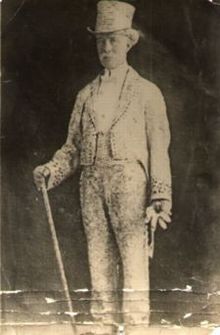Pearly Kings and Queens, known as pearlies, are an organised charitable tradition of working-class culture in London, England.[1][2]

Henry Croft
editThe practice of wearing clothes decorated with mother-of-pearl buttons[1] is first associated with Henry Croft (1861–1930), an orphan street sweeper who collected money for charity. At the time, London costermongers (street traders) were in the habit of wearing trousers decorated at the seams with pearl buttons that had been found by market traders. In the late 1870s, Croft adapted this to create a sequin suit to draw attention to himself and aid his fund-raising activities.[3][4] In 1911 an organised pearly society was formed in Finchley, north London.[1]
Croft's funeral in January 1930 was attended by 400 followers[1] and received national media coverage.[5] In 1934, a memorial referring to Croft as "The original Pearly King" was unveiled in St Pancras Cemetery and in a speech to mark the occasion he was said to have raised £5,000 for those suffering in London's hospitals.[6]
Pearly organisations
editThe pearlies are now divided into several active groups. Croft's founding organisation is called the Original London Pearly Kings and Queens Association. It was reformed in 1975[1][3] and holds the majority of the original pearly titles which are City of London, Westminster, Victoria, Hackney, Tower Hamlets, Shoreditch, Islington, Dalston and Hoxton. Other groups have also been established over the years. The oldest is the Pearly Guild, which began in 1902.[1][7] Modern additions include the London Pearly Kings and Queens Society, which started in 2001[1][4]and the Pearly Kings and Queens Guild.[8] Despite the rivalries, each group is associated with a church in central London and is committed to raising money for London-based charities.[1] A parade of real-life Pearly Kings and Queens was featured at the 2012 Summer Olympics Opening Ceremony.[9]
References
edit- ^ a b c d e f g h Swinnerton, Jo (2004). The London Companion. Robson. p. 18. ISBN 9781861057990.
London Pearly Kings and Queens Society established.
- ^ Howard, Ellie. "The pearly kings and queens: London's 'other' royal family". www.bbc.com. Archived from the original on 2023-04-16. Retrieved 2023-04-25.
- ^ a b "Original London Pearly Kings and Queens Association". Archived from the original on 2008-09-17. Retrieved 2009-09-24.
- ^ a b "London Pearly Kings and Queens Society". Archived from the original on 2009-09-26. Retrieved 2009-09-24.
- ^ "The Passing of the King of Pearly Kings". British Pathe Archive. British Pathe. January 9, 1930. Archived from the original on 2011-06-11. Retrieved 2009-09-24.
- ^ "Memorial to 'Pearly King'". British Pathe Archive. British Pathe. June 4, 1934. Archived from the original on 2011-06-11. Retrieved 2009-09-24.
- ^ "Pearly Guild". Archived from the original on 2009-06-20. Retrieved 2009-09-24.
- ^ "Pearly Kings and Queens Guild". Archived from the original on 6 May 2012. Retrieved 7 May 2012.
- ^ "Rewatching the London 2012 opening ceremony – what was it all about?". BBC Bitesize. Archived from the original on 2023-10-05. Retrieved 2023-10-05.
External links
edit- www.thepearlies.co.uk The Original Pearly Kings and Queens Association
- www.pearlies.org.uk Pearlies of Kings Cross & St.Pancras
- www.pearlysociety.co.uk The London Pearly Kings and Queens Society
- www.pearlykingsandqueens.com Pearly Kings and Queens Guild
- Henry Croft, Pearly King and other Pearly photos on flickr
- The Pearly Families - The Hitchen Family - Pearly King City of London
- "The War of the Pearly Kings", by Mary Braid. The Independent, (16 April 2014). Retrieved 13 March 2021.
- "One last knees up: What does the future hold for London's ageing Pearlies?"[dead link], by Charlotte Leedham. Goldsmiths University of London, (8 January 2018). Retrieved 13 March 2021.
- "What's All This Then? – London's Pearly Kings and Queens.", by John Rabon. Londontopia, (23 February 2017). Retrieved 13 March 2021.